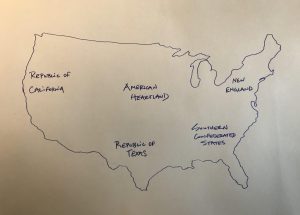There comes a time when mature adults must decide to govern themselves and not others. When honest women and men must acknowledge their sincere differences in human values and political aspirations. When enlightened people must agree to disagree.
That time has come today, in the United States. After more than 200 years of productive experimentation, the country today is fundamentally divided over foundational human values and basic visions for society. Those divisions have become too profound to ignore or to reconcile.
Some Americans believe deeply and earnestly in private health care, gun ownership rights, pro-life values, the death penalty, or closed borders. Other Americans believe sincerely and profoundly in universal health care, public education, gun control, unions, refuge, or family choice. The cleavages between these different values and views of society have simply become too deep. There is no longer good reason for some to impose their set of values on others.
It is time for the citizens of the United States to sort themselves into two or more sovereign states based on popular referenda. The new sovereign states could include—but again, this would be a matter of popular decision-making—New England, the Republic of Texas, the Republic of California, the Southern Confederated States, the American Heartland, Native Lands, among other sovereignties.
By agreement as well, the American people should discuss and reach agreement, or not, on the possibility of an “American Union” so that there would be no tariffs between the new sovereign states, or on the possibility of an organization, such as an “American Treaty Organization,” to assure the common defense. But separate sovereign governments would entail separate political and legal institutions, separate tax and revenue mechanisms, and separate military defense and policing bodies.
The current national debt likely would have to be divided, perhaps distributed to each new sovereign state by their proportional number of votes in the Electoral College. The existing social security system would have to be distributed as well, possibly on a proportional basis by aggregated personal contributions.
All of these details would have to be worked out at a constitutional convention whose task would be to propose a constitutional amendment for the dissolution of the United States of America and the constitution of new sovereign states. This could be done peacefully and submitted to the American people for passage as an ordinary constitutional amendment.
In the meantime, of course, everyone will continue to invest their times, their lives, and all their resources into trying to win executive and legislative majorities in the next sets of elections. Barring an agreement to disagree, we all would continue the struggle to impose our values on others.
But it is time to begin to imagine a peaceful resolution of what are, today, truly unbridgeable differences. As mature public citizens, we would all be better off governing simply ourselves.
Sapere aude! (“Dare to be wise!”)
— Horace, Book of Epodes
— Kant, “An Answer to the Question: ‘What Is Enlightenment?'”

